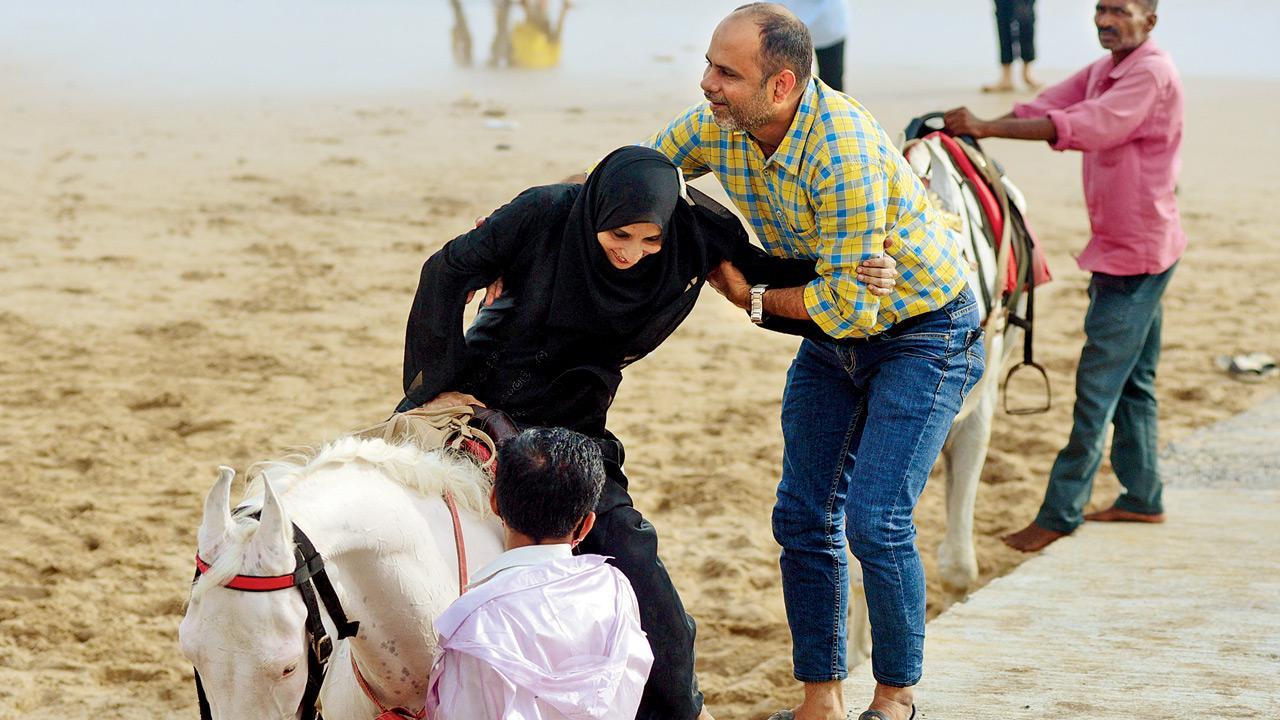The city - sliced, diced and served with a dash of sauce

Pic/Rane Ashish
Hay, Help’s Here!
ADVERTISEMENT
A man helps his partner get off a horse at Versova Chowpatty.
Don’t mute our rights
Since the world went online last year, artistes have found themselves face to face with several problems such as copyright issues, sexual harassment and plagiarism. Who do you turn to for guidance in such situations? To make legal aid and know-ledge more accessible to artistes, Delhi-based arts scholar Dr Arshiya Sethi, and Kolkata-based performer-arts manager Paramita Saha (in pic) and dancer-lawyer Somabha Bandopadhyay have joined hands to set up a website called Unmute, which is a performer’s guide to laws, rights and resources. The website (www.unmute.help) goes live on Thursday. “It’ll act as a resource centre for information, and as an independent advisory platform to offer guidance to artistes, and help build a partner network,” Saha explained. Perpetrators in the art world exploit the culture of silence, she said. “We want to create a pro-active space for discussion to break this culture.”
All art for elephants
To further the conversation on the conservation of elephants, over 80 artists are coming together for a fundraising exhibition, this World Elephant Day, tomorrow, at Gallery Art & Soul. Put together by World Wide Fund for Nature-India (WWF India), Cyril Amarchand and Mangaldas, and Art & Soul, the curated show, Little TRUNKETS, will honour the mighty Asian elephant. Dr Dipankar Ghose, director, wildlife and habitats, WWF India, shared that the exhibition is aimed at raising support for elephant conservation. Dr Tarana Khubchandani, director, Art & Soul, said, “I’m giving a voice to the much-loved pachyderm and to all our artists who responded in minutes with heartfelt tributes in the form of paintings, sculptures and ceramics for the cause.”
No regrets for Dolly
From being one of the earliest newscasters in India, to capturing the hearts of audiences with her theatre performances and standing up for the rights of the destitute, Dolly Thakore has had quite a journey. There have been ups and downs, she admitted to this diarist, but Thakore has no regrets. This eventful life will come alive in her memoir, aptly titled Regrets, None (HarperCollins). “I started writing it in 1982, then I stopped, started again and paused. I restarted work on it three years ago,” said Thakore, adding that she has vivid memories of the past. “From Kanpur and Delhi, to Mumbai and London, I’ve travelled widely; it’s been a happy journey,” she shared about her memoir that hits bookshelves in September.
Band together
The Band-it Festival is an event that gives schoolchildren a chance to show off their musical prowess. It’s open to stud-ents between classes 5 and 10, where they have to form musical groups and compete for the winner’s title. People from across the country can take part, and registrations are open till August 30. “This is an ideal national-level platform where the students can express themselves. More than 20,000 people have already performed,” shared Dharini Upadhaya, CEO and co-founder of Furtados School of Music, the organiser of the festival. Want to find out more? Visit the school’s website.
Caste a shadow on history
Bad Hair by Rahee Punyashloka
To be in someone’s shadow generally implies influence. But in the context of Indian history, the shadow of untouchable communities had a different connotation. For everyone else, the shadow was supposed to be impure and a threat of pollution, pointed out Dalit artist and filmmaker Rahee Punyashloka, whose show opens at Method Bandra on Independence Day. Called Séances, Featuring my Kin with Fantastically Large Shadows, the title is a play on the word shadow. The Bhubaneswar-native added that depending on the severity of how rigidly Brahmanical values were followed, there have been active laws in our history banning untouchables from entering the city during sunlight hours to ensure their shadow doesn’t fall on others.
“As a Dalit individual who shares the heritage of these ‘shadow-banned’ ancestors, my art is about communicating with the incredible legacy these kin of mine left behind — the fantastically large shadows that they have left imprinted on my personal and political awakening,” he said. Punyashloka’s work will shed light on how the history of modernity has been more often than not influenced by the visionary thoughts and assertions from Dalit-Bahujan-Adivasi people. “The focus is to rightfully placate people from these communities, my communities, as the pioneers of civilisation, and not as mere ‘backward’ bystanders,” he noted.
 Subscribe today by clicking the link and stay updated with the latest news!" Click here!
Subscribe today by clicking the link and stay updated with the latest news!" Click here!






